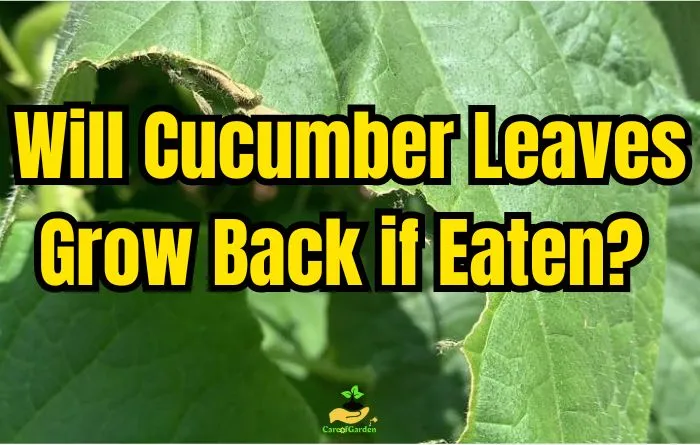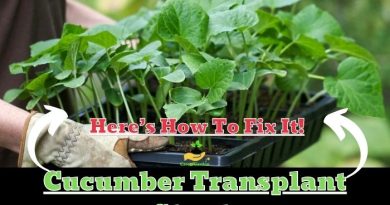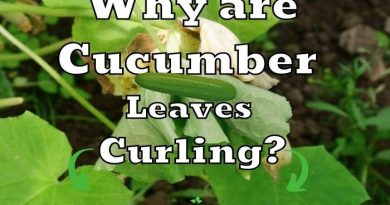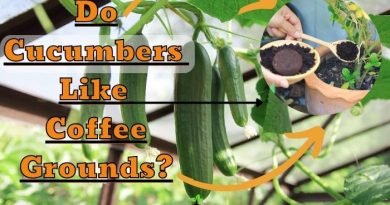Will Cucumber Leaves Grow Back if Eaten? The Truth!
Have you ever wondered if cucumber leaves can grow back after being eaten? As a gardener who faced this issue, I’m here to answer that burning question for you.
Cucumber leaves have the potential to regrow after being eaten, but the extent of regrowth depends on various factors. If only partially eaten, cucumber plants can rejuvenate and produce new leaves. However, severe damage or complete destruction of the above-ground portions may prevent regrowth. As annual plants, if the leaves are entirely consumed, the cucumber plant’s growth for the season will cease.
Key Takeaways:
- Cucumber leaves can regrow if only partially eaten.
- Severe damage or complete destruction may hinder regrowth.
- Cucumber plants are annuals, and if the above-ground parts are destroyed, the plant’s growth for the season will end.
- Installing a tall fence or using repellents can help protect cucumber plants from being eaten by animals.
- Specific cucumber varieties, such as pickling cucumbers or those with spiky peels, are less appealing to deer and may deter them from consuming the plants.
Can Cucumber Leaves Grow Back if Eaten?
From my gardening experience, I can say that cucumber leaves have a remarkable ability to regenerate from leaf damage caused by various factors, including pests like deer, rabbits, and insects, but the extent of their recovery depends on a few factors:
1. Timing
In my gardening experience, the timing of the damage is crucial. Give your cucumber plants at least 5 days to recover. It’s not uncommon for them to bounce back within this timeframe.
If the leaves have only been partially eaten and the stems and roots are intact, there’s a good chance the plant will recover. However, if the entire plant has been devoured, it’s less likely to bounce back.
Give your cucumber plants at least 5 days to recover. It’s not uncommon for them to bounce back within this timeframe.
2. Severity of damage
When cucumber leaves are partially eaten, the plant can often regenerate new foliage. Cucumber plants have the ability to produce new leaves from the undeveloped buds on the stem.
However, if the damage is severe and the leaves are completely consumed or destroyed, the plant may not have the opportunity to regrow.
3. Cucumber Health
The overall health of the cucumber plant matters. Healthy plants with well-established root systems are more likely to regenerate successfully.
As long as the roots of the cucumber plant are intact, it has the potential to recover. The roots supply nutrients and water necessary for new leaf growth.
4. External factors (pests and animals)
External factors also come into play when considering cucumber leaf regeneration. Pests and animals, particularly deer, can cause significant damage to cucumber plants.
It’s essential to identify the pest responsible for the damage. Different pests may require different control measures. If you notice specific signs or critters in your garden, addressing them promptly is crucial to prevent further harm.
| Pest that Eat Cucumber Leaves | How it damages the cucumber plant | How to combat |
|---|---|---|
| Groundhog | Nibbles on leaves and can cause extensive damage. | Erect a sturdy fence or trap and relocate it. |
| Deer | Eats leaves, particularly the tender ones. | Install netting, mesh cages, or a tall fence. |
| Rabbits | Consumes leaves, often leaving clean-cut edges. | Use fencing or rabbit repellent. |
| Aphids | Feeds on sap, causing yellowing and curling of leaves. | Apply insecticidal soap or neem oil spray. |
| Caterpillars | Chew holes in leaves, leaving behind irregular damage. | Handpick or use biological or chemical control. |
| Gophers | May not eat leaves but can dig burrows near plants. | Trap or use gopher repellents. |
Installing a tall fence around the garden or using repellents can help protect the plants from being eaten.
Remember that cucumber plants are resilient, and many gardeners have successfully rejuvenated them after leaf damage. Keep an eye on your plants, provide necessary protection, and with a bit of patience, you may see your cucumber leaves growing back.
How to Protect Cucumber Leaves from Being Eaten
To prevent cucumber leaves from being consumed, there are several effective measures that can be taken to protect the plants from animals.
| Protective Measures | Efficacy |
|---|---|
| 1. Install Tall Fence | Highly effective against animals like deer. |
| 2. Use Repellents | Can be effective in deterring animals, but may need to be reapplied regularly. |
| 3. Plant Specific Cucumber Varieties | Varying effectiveness, but can reduce the chances of consumption. |
1. Use Protection Measures
To protect your damaged plant while it recovers, consider using fencing, netting, or deterrent sprays.
Fencing, in particular, can be effective against larger pests like deer and groundhogs. This can help keep animals like deer out, as they are less likely to jump over a higher barrier.
Using deer repellent sprays, like Bonide Repels All, can help deter deer and other critters from returning to your plants. Erecting a sturdy fence or using a hotwire can provide a strong physical barrier to keep wildlife at bay.
Some gardeners have found success with natural deterrents like cayenne pepper or powdered lime, which can make the leaves less appealing to pests.
2. Provide the Extra Care
Continue caring for your cucumber plant as you normally would. Keep the soil adequately watered and ensure it receives the right amount of sunlight.
A healthy plant is more likely to recover. Pruning the eaten leaves a few inches from the main stem can also help redirect energy to new growth.
3. Choose cucumber varieties that are less attractive to pests
Another strategy to deter animals from eating cucumber plants is to select specific cucumber varieties that are less attractive to deer and other animals. For example, pickling cucumbers or those with spiky peels can be less appealing to animals.
Cucumbers with spiky peels, also known as prickly cucumbers, have small, soft spines on their skins. These spines act as a natural deterrent for animals, making them less likely to nibble on the leaves.
The texture and prickliness of these cucumbers make them less palatable and less appealing to pests. By selecting cucumbers with spiky peels, you can help protect your cucumber plants from leaf consumption.
| Cucumber Variety | Characteristics |
|---|---|
| Pickling Cucumbers | Smaller fruits, crisper texture |
| Cucumbers with Spiky Peels | Small, soft spines on the skins |
4. Be Patient
Cucumber plants are hardy, and with favorable conditions, they can produce new leaves within a few days to weeks. Keep a close eye on your plant’s progress, and you might notice new growth emerging from the main stem or leaf nodes.
To avoid future damage, maintain your protective measures and regularly inspect your garden for signs of pests or critters. Early detection and intervention can save your cucumber plants from further harm.
Can a cucumber plant survive without leaves?
I can confidently say that cucumber plants require leaves to produce energy through photosynthesis. Therefore, it is highly unlikely that a cucumber plant would survive without leaves.
However, from my experience, adding compost to the base of the plant can help revive a cucumber that’s not growing well.
Will cucumbers grow back after deer eat them?
Whether or not cucumbers will grow back after deer eat them depends on the extent of the damage. If the deer only ate the leaves or stems, the cucumber may recover and produce new growth.
However, if the deer ate your entire cucumber or damaged it severely, it’s unlikely that the plant will recover.
Conclusion
In conclusion, cucumber leaves may grow back if they are only partially eaten by animals like deer. However, if the plants are severely damaged or destroyed, they may not have the opportunity to regrow.
Cucumber plants are annuals, so if the above-ground portions are completely destroyed, that will be the end of the plant for the season.




